Contact center of the Ukrainian Judiciary 044 207-35-46
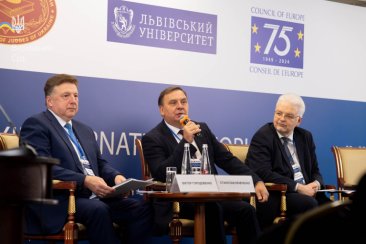
Changing the approach to the application of the European Convention on Human Rights in Ukraine, the nuances of interaction between national and international courts, mechanisms of compensation for damage caused by the Russian aggression against Ukraine, criteria for assessing judicial integrity in the light of Council of Europe standards, shaping the worldview of Ukrainian lawyers based on the best European practices and a human-centred approach. These issues were discussed at the two-day XII International Forum on the Case Law of the European Court of Human Rights ‘Implementation of the European Convention on Human Rights in Ukraine’, which took place in Kyiv on 29-30 October 2024.
The topic of the first session of the forum was ‘Implementation of the European Convention on Human Rights in Ukraine’. As part of this section, Mykola Gnatovskyy, ECtHR judge from Ukraine, delivered a keynote speech on ‘Subsidiarity and review of court decisions through a process-based approach: a change in the approach to analysing the application of the European Convention on Human Rights by national courts’.
He noted that the inclusion of the concepts of ‘margin of appreciation’ and ‘subsidiarity’ in the preamble to the Convention for the Protection of Human Rights and Fundamental Freedoms by Protocol No. 15 amending it may seem revolutionary. At the same time, the ECtHR has been applying these concepts for a long time, in particular, in the judgment in Handyside v. United Kingdom of 7 December 1976. However, after the relevant changes, the principle of subsidiarity dominates the ECtHR's decision-making process in practice. Mykola Gnatovskyy emphasised that in the vast majority of cases, the Court assesses the state's compliance or non-compliance with its obligations under the Convention when making decisions.
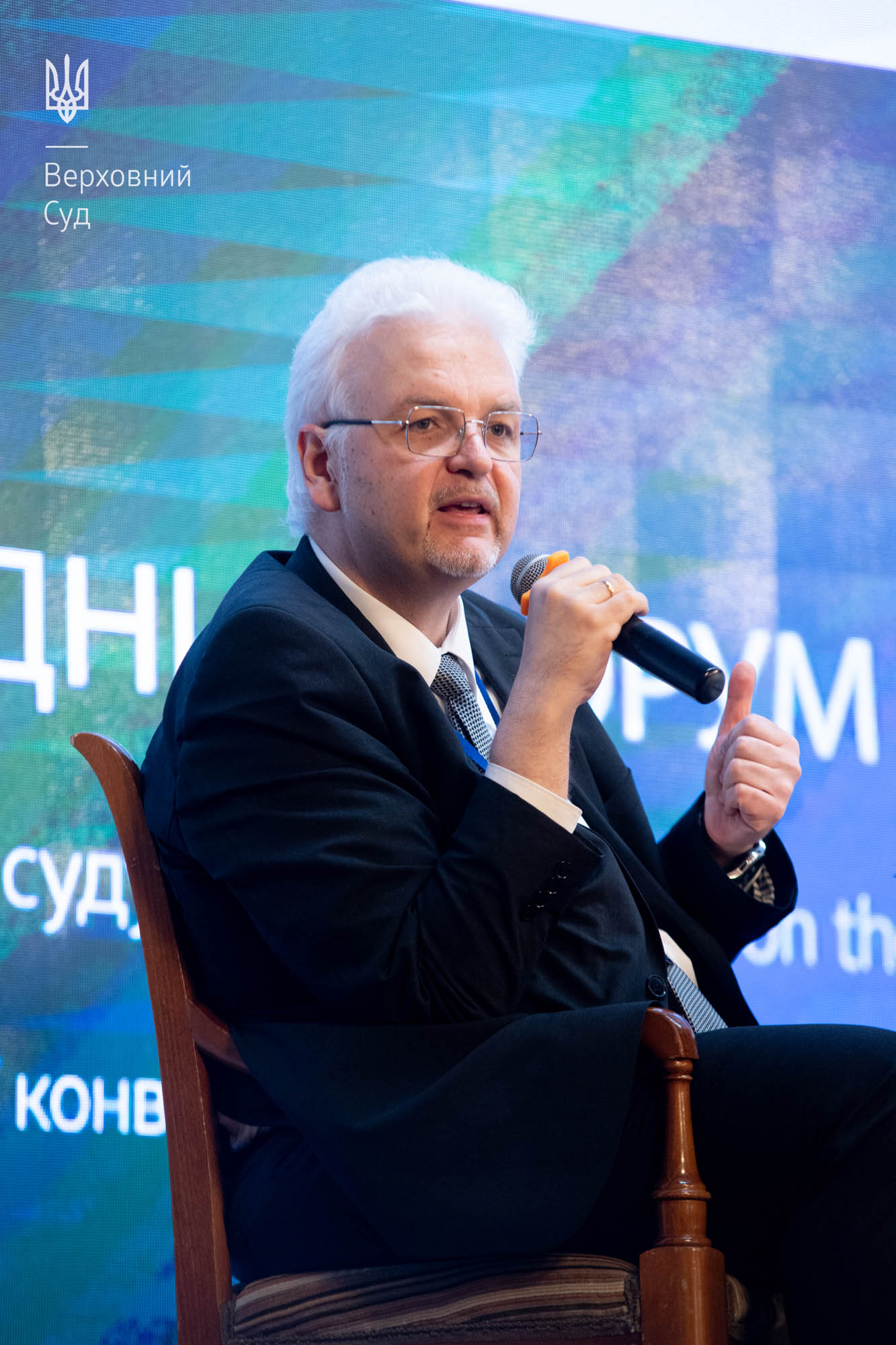
The ECtHR judge noted that, on the one hand, the Court does not take over the functions that are reserved for sovereign states. That is, the state must have a margin of appreciation. On the other hand, the European system of human rights protection will be effective only if it is not detached from the work at the national level. No international court will ever ensure human rights in any state alone if the courts of that state do not do so first and foremost. That is, it should be a shared responsibility.
Mykola Gnatovskyy emphasised that the ECtHR will not replace national courts, let alone national parliaments or executive authorities, provided that when making decisions, these institutions comply with the requirements to provide relevant and sufficient reasons for interfering with a particular right guaranteed by the Convention.
Dmytro Hudyma, Judge of the Civil Cassation Court of the Supreme Court, spoke on the topic ‘Alienation of property by the state as a result of a mistake or intentional unlawful acts: finding a balance of interests’.
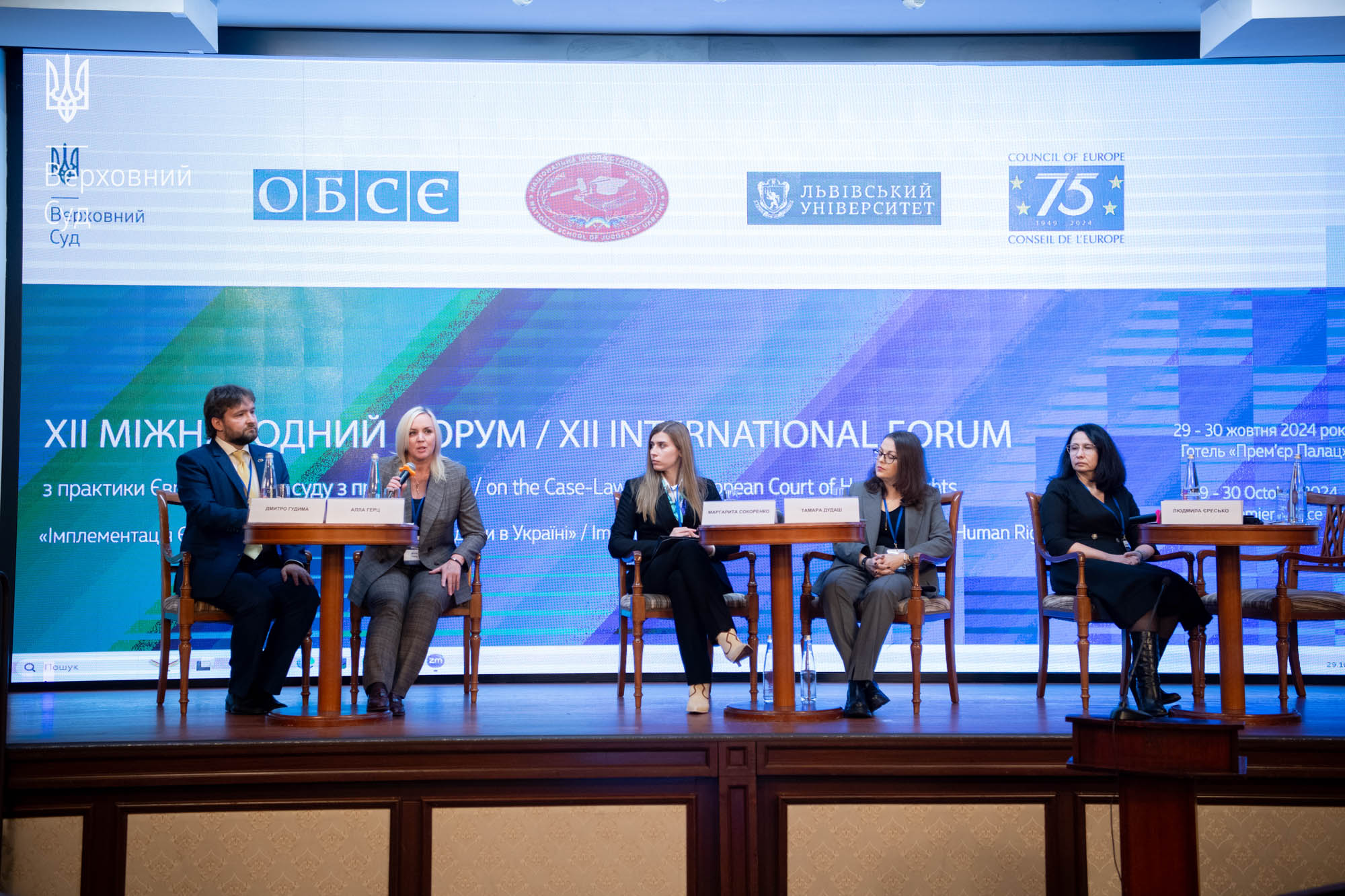
The speaker noted that the principle of subsidiarity applies to situations involving rights that the state can restrict. One of these is the right to peaceful enjoyment of property. The lack of respect for private property is an obstacle to the development of society, but it can also be an obstacle to tolerating unfair actions with the property of the state or the community. Therefore, it is necessary for the court to find a balance of interests in situations involving the alienation of state or community property as a result of mistakes made by the authorities or their deliberate actions.
The judge noted that Article 1 of Protocol No. 1 to the Convention provides for the possibility of applying restrictions, in particular to ensure the control of property in order to protect the general interest. He analysed a number of cases in which the Grand Chamber of the Supreme Court, in striking a balance between the interests of the state or the community on the one hand and the private interests of the acquirer of the property on the other, favoured the general interest. In addition, Dmytro Hudyma drew attention to the inadequacy of some of the constructions for the protection of the rights of a bona fide purchaser proposed in the draft Law No. 12089 of 3 October 2024.
For more details, please see Dmytro Hudyma's presentation - https://court.gov.ua/storage/portal/supreme/prezentacii_2024/Prezent_Vidch_maina_derg_pomilka_umisel.pdf.
Alla Hertz, Professor of the Department of Civil Law and Procedure at Ivan Franko National University of Lviv, spoke about the case law of the European Court of Human Rights in cases concerning the protection of property rights.
She noted that ECtHR judgments provide guidance on the criteria to be followed. However, national courts have to make their own decisions. The question of what criteria should be applied by national courts remains relevant. Article 1 of Protocol No. 1 to the Convention contains three separate provisions: on the peaceful enjoyment of property; the grounds for deprivation of property; and the right of the state to control the use of property in accordance with the general interest. These norms are interrelated, but the second and third are directly considered in the context of the first, taking into account the principles of the rule of law and legal certainty.
Liudmyla Yeresko, Judge of the Administrative Cassation Court of the Supreme Court, delivered a presentation on ‘Restrictions on travelling abroad’. She emphasised the relevance of the topic for Ukrainian citizens in times of war.
The judge spoke about the Supreme Court's case law on restrictions on travelling abroad during the war. The Supreme Court concluded that during the period of martial law, the State Border Guard Service of Ukraine is vested with additional powers. Article 8 of the Law of Ukraine ‘On the Legal Regime of Martial Law’ provides for the possibility to temporarily restrict the constitutional rights of citizens, in particular, to establish a special regime of entry into and exit from the country as an exceptional temporary measure of the legal regime of martial law.
In this matter, the Court sought a balance between the freedom of movement guaranteed by the Constitution of Ukraine and the Convention, the constitutional duty of a citizen to protect the state and the public interest and concluded that in the present case the public interest had the primary priority, given the unprecedented scale of threats to Ukraine's sovereignty and independence.
Tamara Dudash, Associate Professor of the Department of Theory and Philosophy of Law at the Ivan Franko National University of Lviv, spoke on the topic ‘The quality of arguments from the case law of the European Court of Human Rights in the practice of Ukrainian courts as a basis for the proper implementation of the European Convention on Human Rights in the legal system of Ukraine’.
The researcher noted that the principle of subsidiarity means, in particular, that all arguments of national courts must be properly presented to demonstrate that the courts have heard the parties and that court decisions are convincing to the public. She pointed out that often the construction of an argument in a decision is reduced to the presence of quotations from the ECtHR judgment. The speaker noted that the argument should be constructed in such a way that there is a premise, a conclusion and connections between them.
Tamara Dudash analysed the Opinion No. 20 (2017) of the Consultative Council of European Judges on the role of courts in ensuring the uniformity of the application of the law. In particular, she drew attention to the fact that a court decision will be perceived as arbitrary if any argument is not properly stated.
Marharyta Sokorenko, Agent of Ukraine before the European Court of Human Rights, highlighted the challenges in implementing the ECtHR judgments on the return of children to their country of habitual residence and contact arrangements in the context of martial law.
She analysed the group of cases M.R. and D.R. v. Ukraine, in which the ECtHR ruled that Ukraine violated Article 8 of the Convention due to the failure of state authorities to comply with the requirements for promptness of proceedings or non-enforcement or prolonged enforcement of national court decisions on the return of children. This group of cases currently comprises three judgments, the first of which was delivered in 2018.
When considering cases of this category, the ECtHR has formulated a number of principles that the Court applies when considering relevant complaints from applicants. First of all, the ECtHR takes into account how the state authorities have complied with the obligation to take all necessary measures to reunite parents with their children. At the same time, this obligation is not absolute, since sometimes the reunification of parents with their children cannot be immediate and requires appropriate preparation. The ECtHR also stressed that cooperation of all parties concerned is an important component in such proceedings. If one of the parents resists, the relevant authorities should be able to impose sanctions on him or her.
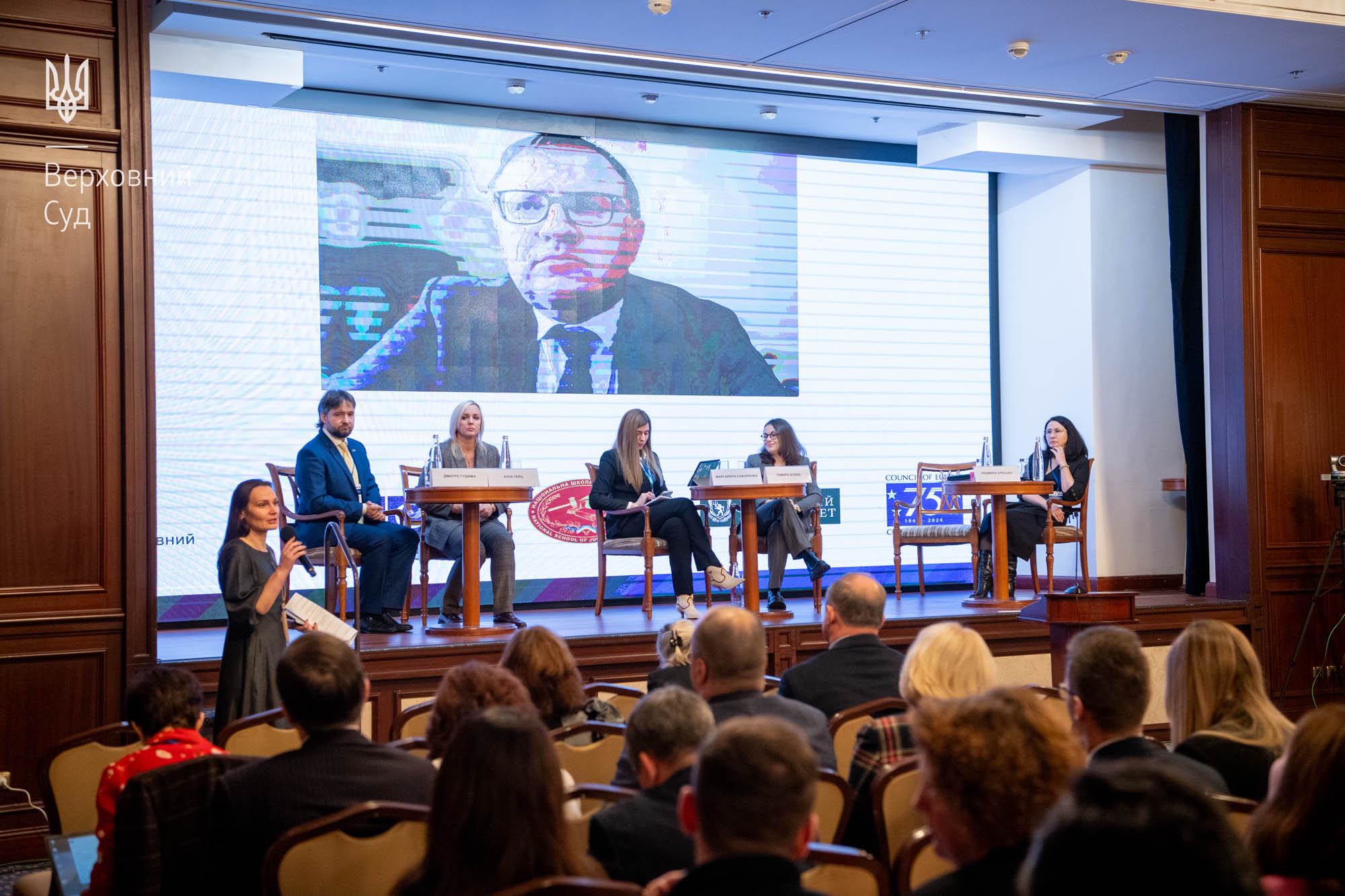
The state of implementation of ECtHR judgments in Ukraine remains a significant topic for discussion. It is worth not only reflecting on this issue from a legal point of view, but also considering these judgments as binding instruments of international law that create obligations for Ukraine under Article 46 of the Convention. This opinion was expressed by Pavlo Pushkar, Head of the Division at the Department for the Execution of Judgments of the European Court of Human Rights of the Directorate General for Human Rights and the Rule of Law of the Council of Europe, in his report ‘Implementation of the Judgments of the European Court of Human Rights by Ukraine: How to Move Forward?’.
According to the speaker, in 2024, the Committee of Ministers of the Council of Europe considered a number of key cases related to Ukraine. Among them are cases related to the events of the Revolution of Dignity, as well as cases related to the independence of the judiciary. Cases concerning the legality of deprivation of liberty, conditions of detention and the right to defence in criminal proceedings were also considered.
Among the achievements, we can highlight the transfer from enhanced to standard supervision of the execution in the Balytskyi/Yaremenko v. Ukraine group of cases, which was made possible by significant legislative changes. It is also important to resolve the issue of closing the supervision in the case of Chanev v. Ukraine, which concerned a legislative gap in the CPC of Ukraine.
Despite these positive developments, there are still some problems in other categories of cases that require further attention and efforts. Enforcement of the ECHR judgments should become not only an obligation but also a mechanism for changing Ukraine's legal system and facilitating European integration processes.
In conclusion, Pavlo Pushkar stressed that the Council of Europe is always ready to support Ukraine in its efforts to implement the ECtHR judgments, in particular through constant close dialogue and cooperation projects.
Mykola Hnatovskyy, ECtHR judge from Ukraine, spoke during the discussion ‘Achievements and challenges of the implementation of the European Convention on Human Rights in Ukraine: the criminal aspect’. According to him, the issue of bringing to justice those accused of international crimes is important. States are obliged to take all necessary measures to ensure that those responsible for such crimes are punished.
Bringing perpetrators to justice for international crimes is not only a political desire of the state, but also its duty under international obligations. However, there is also a significant aspect related to the rights of persons accused of committing these crimes. States parties to the Convention are obliged to comply with the relevant conventional standards in their practice.
Mykola Hnatovskyy noted that this task is particularly challenging, as most of the existing standards are designed to address ordinary crimes under national criminal law, rather than crimes that infringe on the international legal order. Finding a balance between the rights of the accused and the fulfilment of international obligations is a challenge that requires detailed analysis and the development of effective mechanisms.
The topic ‘Prosecution by national authorities for crimes against international law: the issue of the lack of retroactive effect of criminal law under Article 7 of the European Convention on Human Rights’ was continued by Oleksandra Yanovska, a judge of the Criminal Cassation Court of the Supreme Court.
According to the judge, the national Supreme Court will be the final authority on the issue of retrospective application of criminal law and criminal prosecution for war crimes and crimes against humanity. However, these decisions will also be subject to review by the European Court of Human Rights.
And although there is a perception that the main thing is to bring a person to justice, regardless of the specific article of the law, justice must be at the heart of the entire process. Perpetrators of serious crimes should be punished for specific crimes, as some of them have no statute of limitations.
The issue of evidence is also important. Proving war crimes is much more difficult than proving ordinary crimes. At the same time, it is necessary to comply with the requirements of Article 7 of the Convention, as well as national legislation.
The trends and challenges of excessive pre-trial detention during martial law were outlined by Marharyta Sokorenko, Agent of Ukraine before the European Court of Human Rights, and Olesia Otradnova, Director of the Training Centre for Prosecutors of Ukraine.
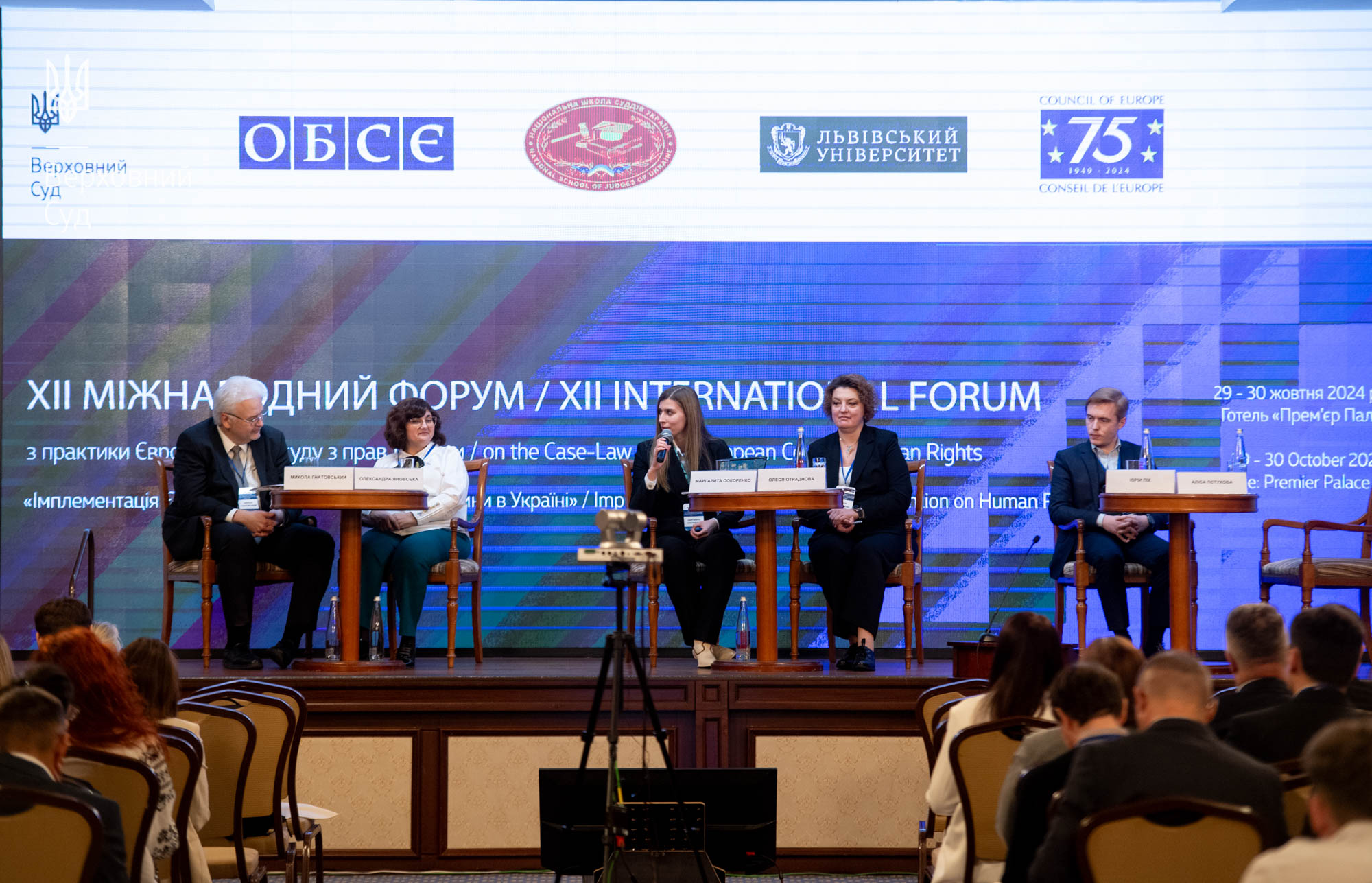
As Marharyta Sokorenko noted, the use of a preventive measure in the form of detention is one of the most common ways to restrict freedom in criminal proceedings. This issue requires special attention, as the prolonged deprivation of liberty of detainees must comply with the requirements of Article 5 of the Convention for the Protection of Human Rights and Fundamental Freedoms.
In addition, this article guarantees the right to liberty and security of person, but provides for exceptions that allow for the lawful deprivation of liberty. Paragraph 1 of this Article lists six types of circumstances under which a person may be detained. This list is exhaustive, which emphasises the importance of compliance with legal requirements when applying a preventive measure.
At the same time, detention, although a common measure, should be applied only in accordance with the conventional norms.
According to the ECtHR case law, the question of the legality of deprivation of liberty is considered individually, taking into account the specific circumstances of each case.
Speaking about the use of detention as a preventive measure, Olesia Otradnova noted that the worldview of prosecutors and judges directly affects their decision to apply preventive measures. Although the law already allows for the avoidance of detention in many cases, current practice is often conservative. Changing this mindset is a complex and time-consuming process that requires efforts at all levels, from universities to professional training centres.
The use of bail as an alternative to detention is another important aspect that the speaker emphasised. Statistics show that the largest bail amounts that have been applied are mostly related to corruption offences. This underscores the need to develop the practice of using alternative measures of restraint.
Yurii Pikh, Assistant of the Department of Criminal Procedure and Forensics, Faculty of Law of Ivan Franko National University of Lviv, spoke about evidence and proof when applying a preventive measure in the form of detention.
As the researcher emphasised, evidence and proof is one of the most complex and sensitive issues in the field of justice, especially in the context of the standards set out in the European Convention on Human Rights. At the same time, the ECtHR is cautious about the issues of evidence and proof, sometimes leaving them exclusively to the national legislator. However, this does not mean that the Convention and the case law developed by the ECtHR do not contain uniform standards on evidence and proof.
The established case law contains important guidelines that can serve as a reference point for national courts. This is important because standards of proof have a direct impact on the protection of human rights, in particular in the context of preventive measures, which are among the most serious interventions in the rights of individuals in criminal proceedings.
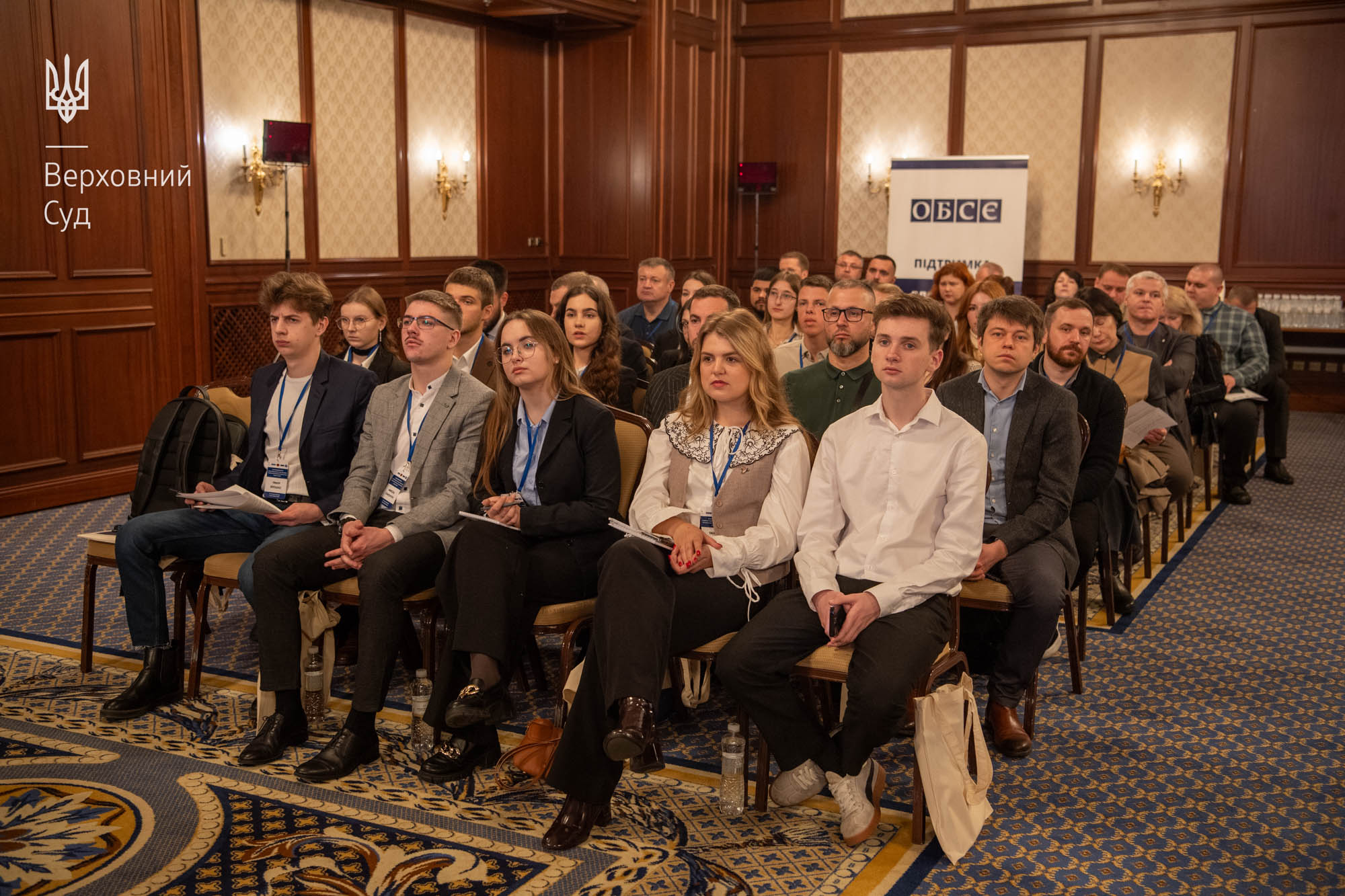
The second section of the international forum was devoted to the integrity of the judiciary and the search for evaluation criteria.
Philip Dimitrov, Member of the European Commission for Democracy through Law (Venice Commission) in respect of the Republic of Bulgaria, Chairman of the Sub-Commission on Democratic Institutions, noted that integrity is the greatest guarantee of judicial independence and the human right to a fair trial. The issue of the judge's independence should not be confused with the independence of the judiciary.
He said that the Venice Commission has collected a number of materials on measuring judicial integrity: first of all, a judge must be independent and impartial. A judge undergoes a special vetting process before being appointed to the position: the person's experience is studied to conclude that he or she is trustworthy and independent.
The speaker noted that each country has its own form of vetting and requirements for a candidate for the position. A vetting of a sitting judge is a full vetting. In its opinion, the Venice Commission noted that a full vetting should be done with caution. It is important to maintain a balance between, on the one hand, not interfering with the independence of the judge, and, on the other hand, checking whether he or she is really fit for the high office. There should be certainty and clarity in the conclusions so as not to harm the judicial system as a whole.
Pavlo Pushkar noted that strengthening the independence and effectiveness of the judiciary is one of the key issues that the Committee of Ministers of the Council of Europe monitors in the framework of the supervision of the execution of ECtHR judgments on Ukraine, in particular, the structural independence of the judiciary in the case of Oleksandr Volkov v. Ukraine, and strengthening the independence of the prosecutor's office is the main subject of supervision in the case of Lutsenko v. Ukraine.
According to him, the Committee of Ministers positively noted the adoption and implementation of the Law on the transfer of judges from the Supreme Court of Ukraine to the Supreme Court. The Committee of Ministers also welcomed the fact that the HCJ and the HQCJ are fully operational and that there are efforts to fully restore the HCJ's disciplinary function and complete the formation of the service of disciplinary inspectors.
Continuing the discussion, Lorena Bachmaier Winter, international consultant at the Council of Europe, noted that the judiciary relies on public trust, and this is part of ethical standards. For the judiciary, integrity is not just a virtue. It is a necessity, as the functioning of the courts depends on it. The speaker emphasised that integrity is correctness, honesty, morality and the absence of deception. It does not have degrees, and it is impossible to be a person with half integrity.
‘Professional integrity for judges and prosecutors is compliance with the law. There is also the question of the appropriateness of separating work and private life and determining whether behaviour outside of work should be assessed. It is important to establish what are the appropriate limits of behaviour for judges and prosecutors outside of work,’ said Lorena Bachmaier Winter.
In addition, Volodymyr Petrakovskyy, a Council of Europe consultant, noted that in one of its judgments, the ECtHR stated that the Convention does not prevent states from making legitimate and necessary decisions to reform the judiciary. However, the Court has to check how the applicants' Convention rights were affected by the way the reform was implemented. During integrity checks, the Council of Europe suggests that governments take into account their compliance with European and international standards, the principles of legal certainty, and the separation of criminal, administrative and disciplinary liability.
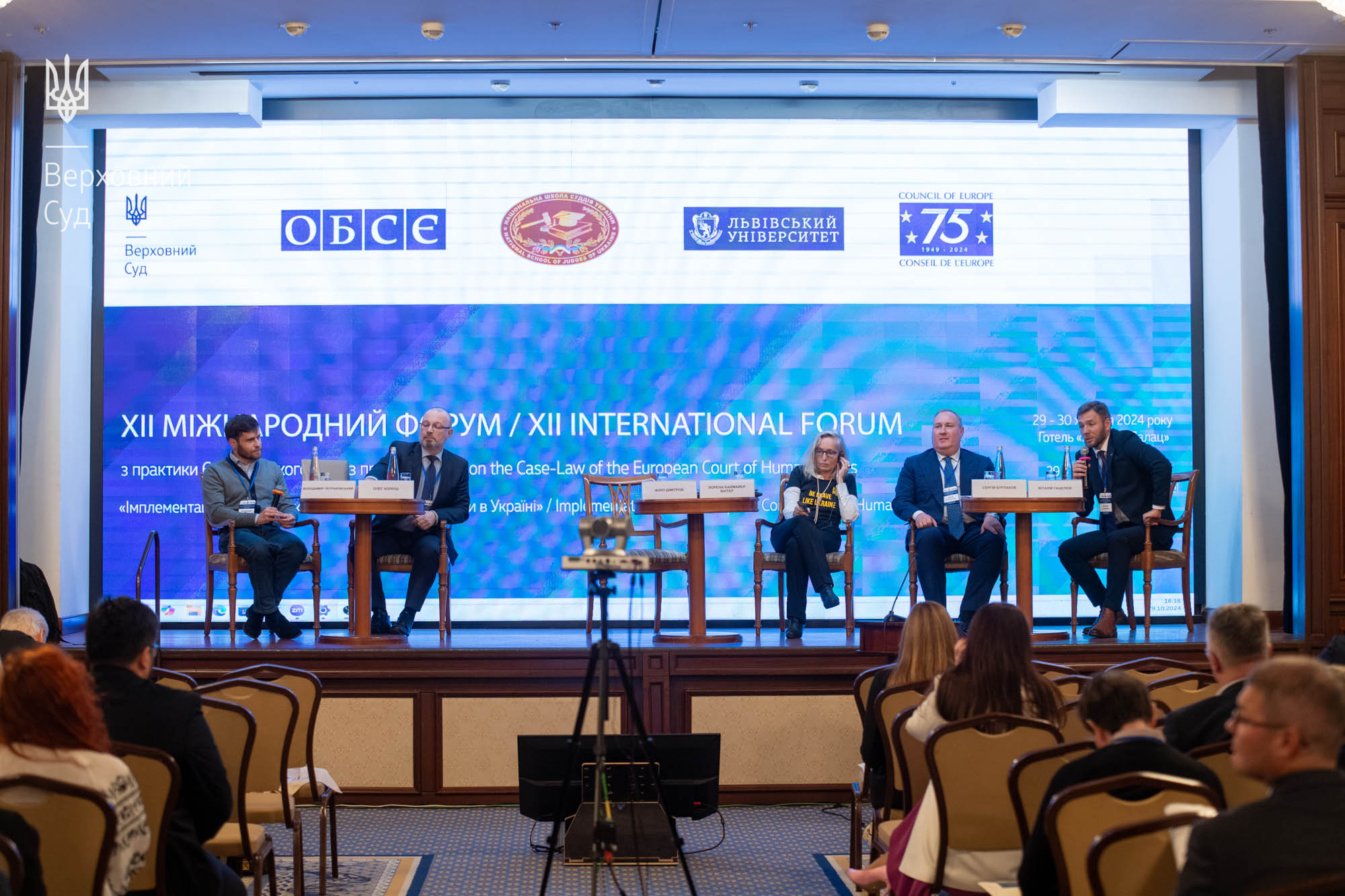
Speaking about the unified indicators for assessing the integrity and professional ethics of judges, Serhiy Burlakov, a member of the HCJ, noted that the discussion on their approval is currently underway. These indicators will be used both during the competition procedure and in disciplinary proceedings. After the adoption of the new version of the Code of Judicial Ethics, the question of its correlation with the criteria of integrity defined in the legislation and disciplinary offences will arise.
Oleh Koliush, member of the HQCJ, noted that Ukraine, in implementing international practices of integrity assessment, has started to assess integrity in terms of points. According to the Law of Ukraine "On the Judiciary and the Status of Judges", integrity has a number of indicators against which it is assessed.
‘The rule of law in the state begins with quality legal education’ was the topic of the final section of the first day of the XII International Forum on ECtHR Case Law, moderated by Rasim Babanly, First Deputy Chief of Staff of the Supreme Court.
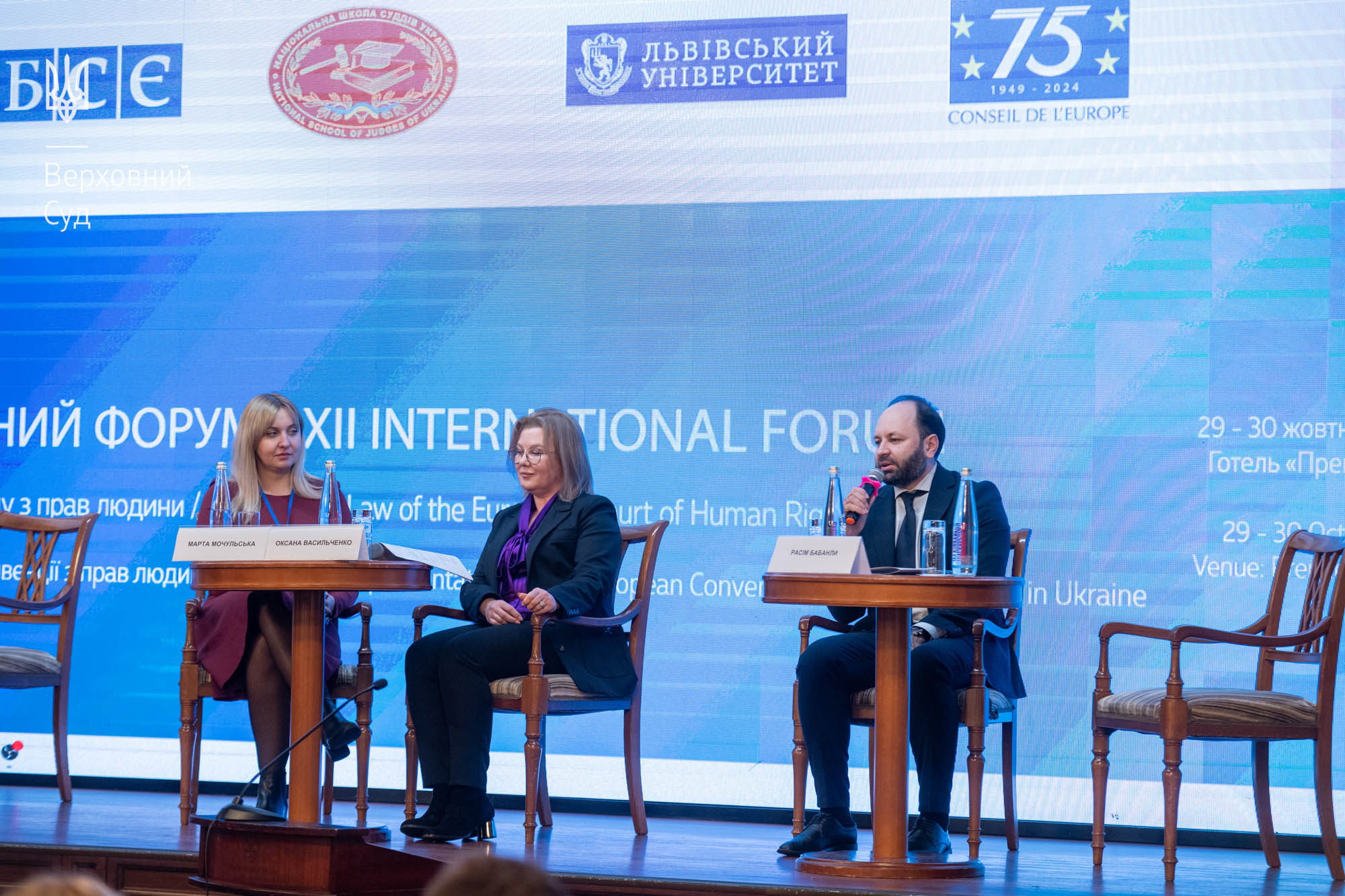
At the beginning of the discussion, the moderator stressed that the purpose of quality legal education is not only to study the ECtHR case law and cite relevant judgments, but also to adapt the worldview of a modern lawyer to the worldview of leading European lawyers.
‘Every judge is a human rights judge in Ukraine,’ said Rasim Babanly. In his opinion, this puts high expectations on the legal education system and its reform in the light of the rule of law.
In response to the moderator's question about the way to build the rule of law in the educational process, Marta Mochulska, Deputy Dean of the Law Faculty of the Ivan Franko National University of Lviv, noted that changing the curriculum in law schools and universities to focus on EU law and ethics contributes to the development of legal awareness of future lawyers, as studying in such institutions is not only about competence, knowledge and skills, but also about personality development, in particular, the development of soft skills that any lawyer should have. According to the speaker, all law schools should undoubtedly provide in-depth knowledge of the ECtHR case law, as well as the communication skills necessary for proper self-actualisation in the professional community.
Oksana Vasylchenko, Director of the Educational and Scientific Institute of Law of the Taras Shevchenko National University of Kyiv, spoke about the training of a professional lawyer and pointed out two components that teachers should consider. First, it is the formation of a high level of legal culture and legal awareness. In her opinion, it is necessary to teach students to understand the importance of law as a set of legal norms that help to resolve issues of urgent importance to society and the state. Secondly, it is the acquisition of the necessary professional knowledge and skills by students. In particular, the speaker stressed that it is necessary to show students the multidimensional nature of the phenomena faced by lawyers, regardless of the area of legal activity chosen by the students.
Volodymyr Venher, Dean of the Law Faculty of the National University of Kyiv-Mohyla Academy, drew attention to the theoretical and practical balance in the senior years of law school education.
According to the speaker, the prerequisite and task of developing legal education is law enforcement and scientific practice.
The speaker noted that legal practice in the broad sense of the word should change both the educational process and the educational standard. According to Volodymyr Venher, most of the educational and professional curricula of law schools should be based on the needs of the legal market. He also emphasised the importance of involving practitioners not only in teaching or guest lecturing, but also in developing courses and educational programmes to train qualified personnel. In addition, Volodymyr Venher spoke about such a new approach as co-teaching.
According to Svitlana Khyliuk, Director of the Ukrainian Catholic University School of Law, most law schools currently have a set of separate courses or components dedicated to European law. By studying the ECtHR case law and the Convention, this theoretical concept has gained practical significance. Through the ECtHR case law, students, teachers and legal practitioners can see how the rule of law is implemented.
Svitlana Khyliuk added that it is important not to memorise the judgments of the ECtHR, but to study the logic of applying the rule of law through the human rights system to practical situations in order to regulate the relationship between a person and the state or other people.
‘Since we have experience in studying Convention law, the methodological approach can be used, among other things, to implement EU law in our educational curricula, as well as in practical training and advanced training of lawyers who already have a full higher legal education,’ the speaker noted.
Yurii Barabash, Vice-Rector for Research and Academic Affairs and Strategic Development of Yaroslav Mudryi National University, highlighted a number of issues in the practice of teaching conventional law in law schools. According to him, the Unified State Qualification Exam is an innovative form of examination that should motivate students to study the subject in depth.
At the same time, according to the speaker, inspiration in learning should be reinforced by showing students their possible career path.
During the discussion held within the IV session of the forum ‘Between Strasbourg and Luxembourg: Scylla and Charybdis or Two Pillars of the European Human Rights Protection System' moderated by Oleksandr Vodyannikov, Senior Project Associate of the OSCE Support Programme for Ukraine, President of the Supreme Court Stanislav Kravchenko reflected on how the Ukrainian court should act if the positions of the European Court of Human Rights and the Court of Justice of the EU on a particular issue contradict each other.
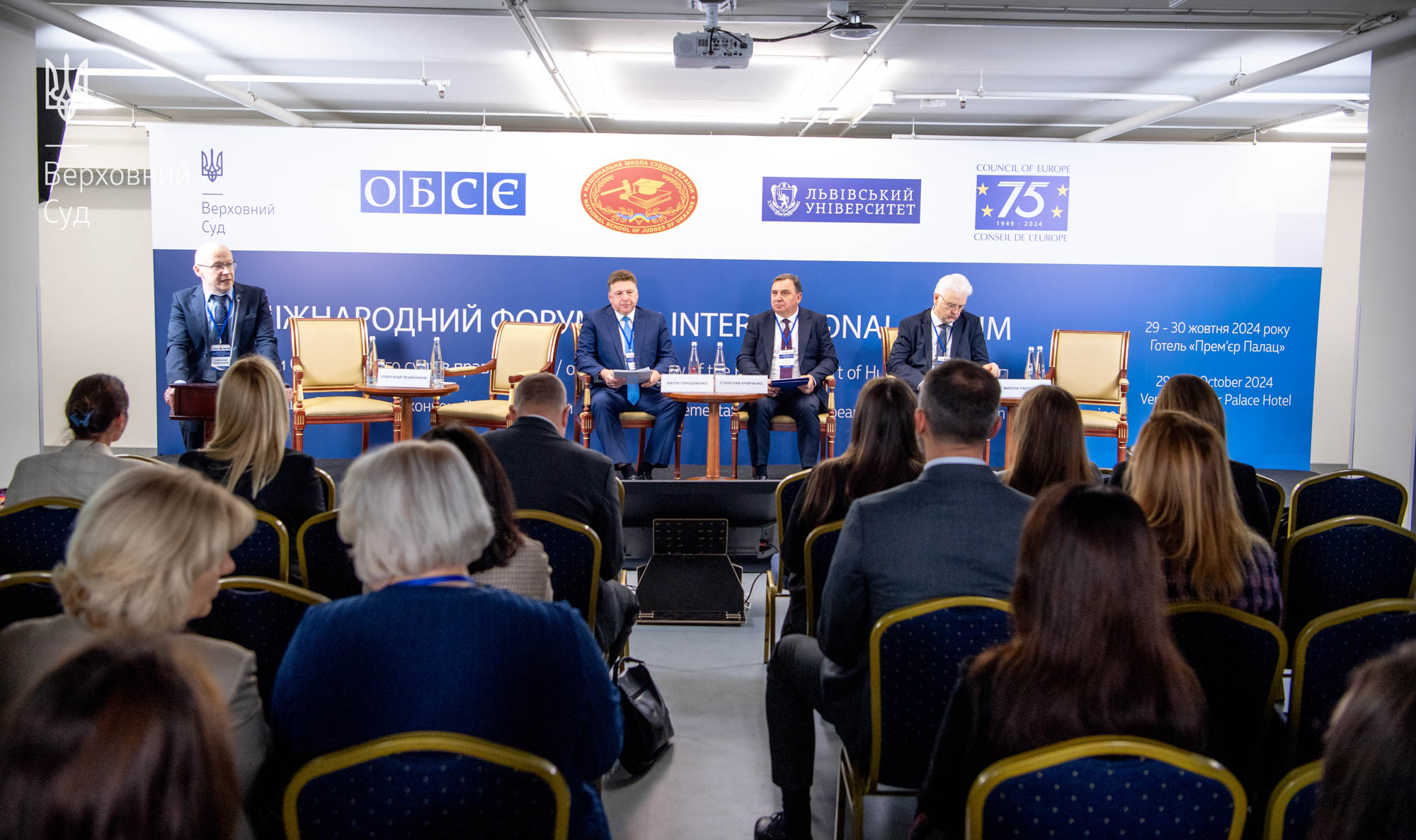
'Undoubtedly, the ECtHR case law should be taken into account first, as it is the source of law in Ukraine. At the same time, we always try to look at a legal issue from different angles. If we see that the case law of the EU Court of Justice covers a certain issue in more detail and this approach to its resolution is relevant in a particular case and best promotes the observance of fundamental rights, we will apply it,’ said Stanislav Kravchenko.
According to the Supreme Court President, the fact that many decisions of national courts contain references to the judgments of the European Court of Human Rights demonstrates that Ukrainian courts consistently implement the established approaches developed by the ECtHR. This process, which has been going on for many years, is systematic, but considerable attention should be paid to the relevant application of the ECtHR case law.
'However, while we have been using the ECtHR case law for quite some time, the EU Court of Justice is relatively new to us. However, in the context of European integration processes, we have begun to actively study and analyse it in advance,' said the SC President.
Judge of the Constitutional Court of Ukraine Viktor Horodovenko shared his vision of the importance of national identity in the context of interaction between national and European courts.
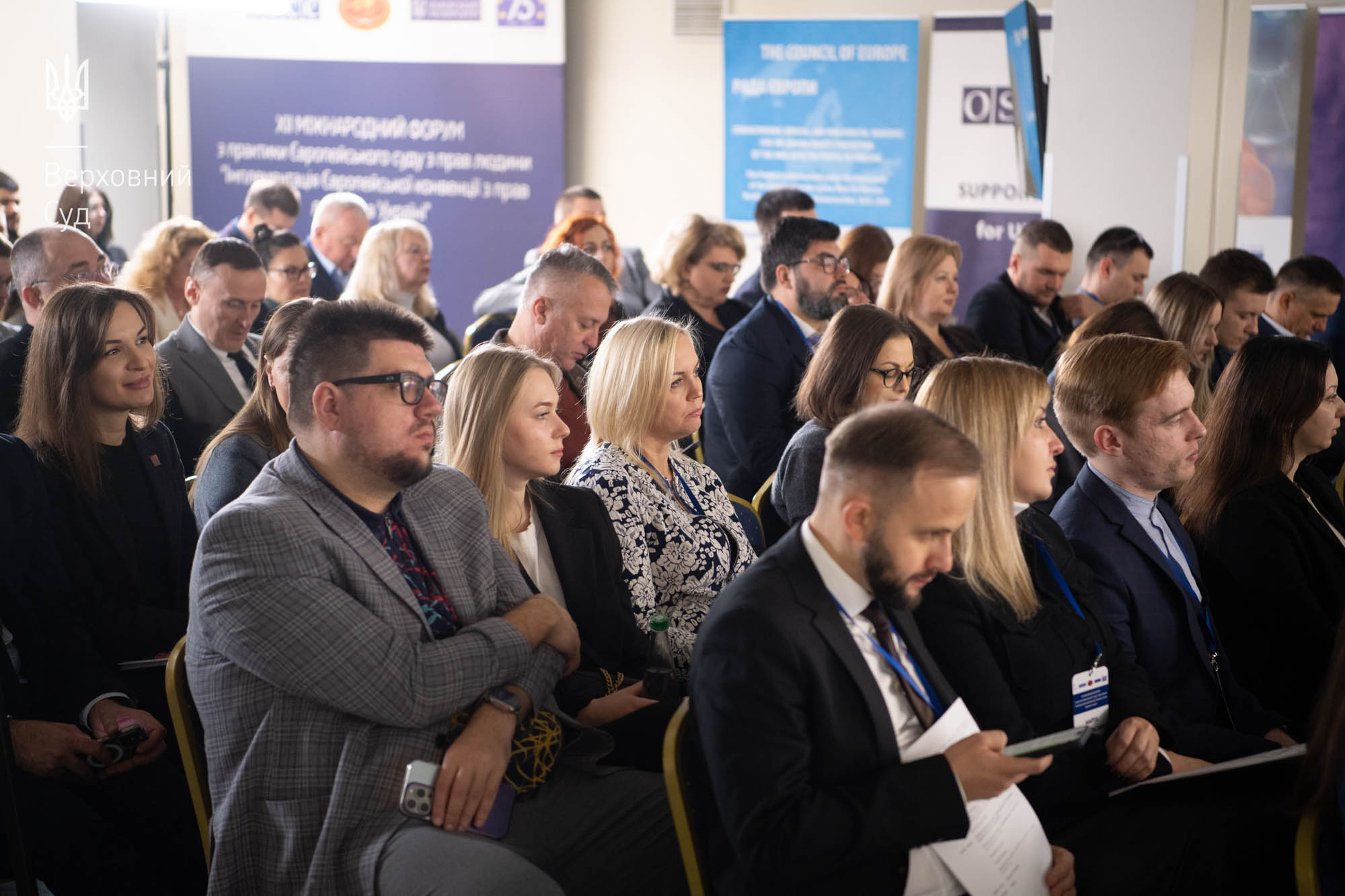
The notion of ‘national identity’ is the basis on which constitutional courts intervene in the dialogue between international courts. The current form of the concept of ‘national identity’ was introduced by the Lisbon Treaty (Treaty amending the Treaty on European Union and the Treaty establishing the EU). The concept of national identity is the functional equivalent of constitutional identity and refers to the existence of different or distinct constitutional identities of states.
The CCU judge also cited the ECtHR judgment in Avotiņš v. Latvia, which states that, when deciding on fundamental rights and freedoms, restrictions may be applied in accordance with the principle of proportionality only if they are necessary and truly meet the objectives of the general interest or protection of human rights.
Mykola Gnatovskyy, judge of the ECtHR from Ukraine, spoke about the instruments of constructive dialogue between the ECtHR and the EU Court of Justice.
Mykola Gnatovskyy noted that law is not an exact science, so there is often no single correct answer to legal questions. Regarding the possible conflicts between the approaches of the ECtHR and the EU Court of Justice in the context of Ukraine as a candidate for EU accession, the speaker drew attention to the need to take into account the goals and results we seek to achieve.
One of the important aspects discussed by Mykola Gnatovskyy is compliance with the obligations assumed by Ukraine under the ratified agreements. The judge emphasised that for the European Union, the European Convention on Human Rights and the case law of the ECtHR are part of the national traditions on which the EU is based. ‘For Ukraine, the issue of accession to the EU begins with the implementation of ECtHR judgments and the solution of systemic problems identified in the ECtHR case law,’ Mykola Gnatovskyy said.
Therefore, a constructive dialogue between the ECtHR and the EU Court of Justice is important for ensuring human rights and compliance with legal obligations, especially in the context of Ukraine's European integration aspirations.
Judge of the Grand Chamber of the Supreme Court Serhii Pohribnyi delivered a keynote speech ‘Review of the National Case Law on Compensation for Damage Caused by War’ at Session V ‘Compensation for Damage Caused by War against Ukraine: Judicial Aspect’.
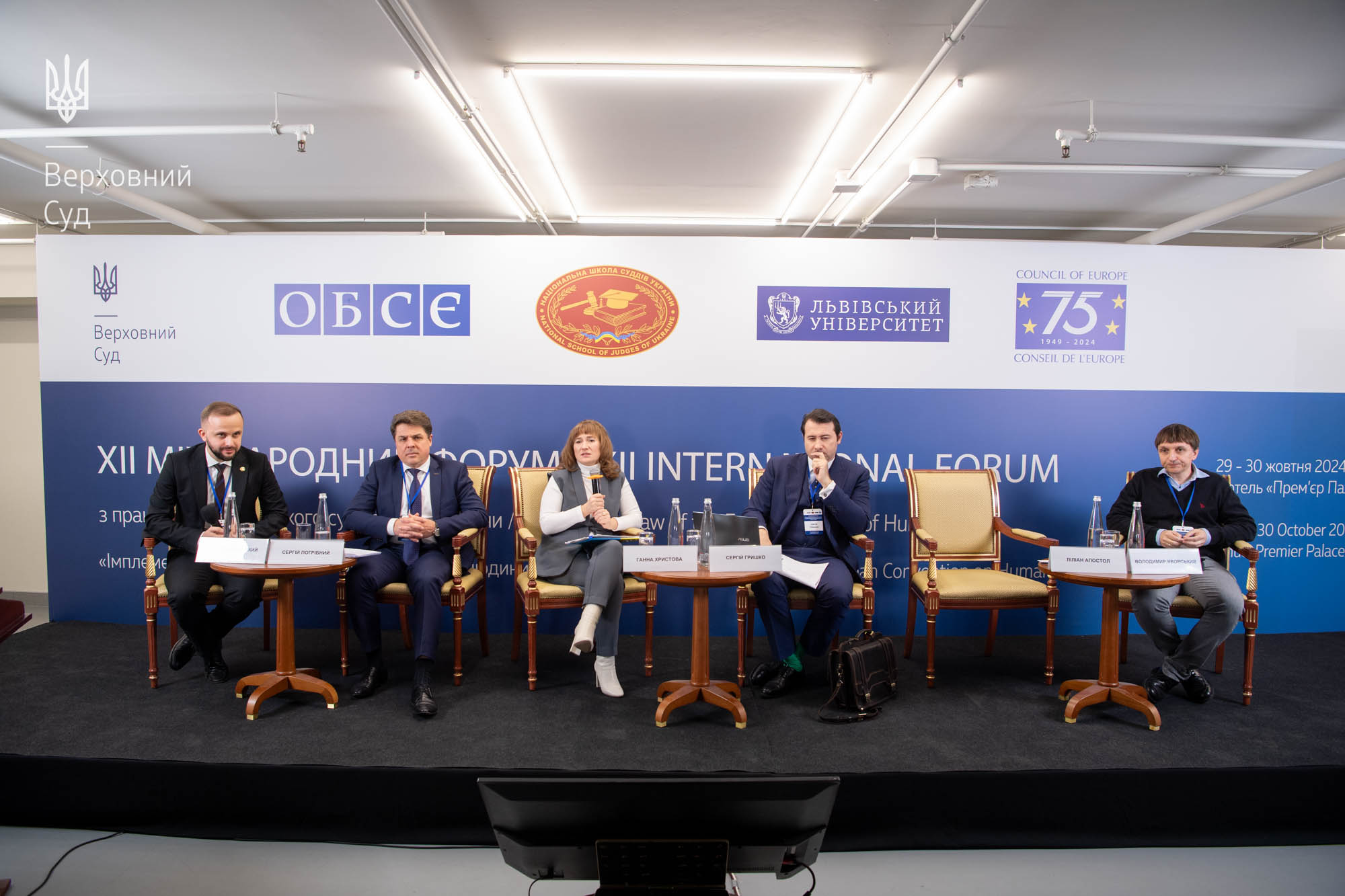
He drew attention to the resolutions of the Civil Cassation Court of the Supreme Court of 14 April 2022 in case No. 308/9708/19 and 18 May 2022 in case No. 760/17232/20-ц, which concern overcoming the judicial immunity of Russia in cases of claims against the aggressor country for compensation for damage caused by the aggression of the Russian Federation. The judge noted that the overcoming of the absolute jurisdictional immunity of the aggressor country was absolutely justified in the circumstances that prevailed at the time. It was a demand of the society and the state. The country was (and still is) at war, and accordingly, the legal profession had to respond to this. The Supreme Court could not stand aside from the problems faced by society and the country.
Serhii Pohribnyi stressed that the Supreme Court's decisions in the spring of 2022 to limit the judicial jurisdictional immunity of the Russian Federation met the country's most pressing needs. Today, Ukrainian society and the state have extremely high hopes that the main function of compensation for damage caused by the armed aggression of the Russian Federation will be performed through international mechanisms. The International Register of Damage Caused by the Aggression of the Russian Federation against Ukraine has already been launched. The speaker is convinced that the decisions of national courts will play a subsidiary role in compensating the affected citizens.
Serhii Pohribnyi's presentation is available at https://court.gov.ua/storage/portal/supreme/prezentacii_2024/Prezent_Shkoda_zavd_war.pdf.
Hanna Khrystova, Head of the Kyiv Office of the Register of Damages Caused by the Aggression of the Russian Federation against Ukraine, spoke about the main issues that arise in relation to the organisation of the Register's work. She noted that there are many such questions, as the international compensation mechanism, of which the Register is the first element, is currently being formed.
She spoke about the stages of the Register's creation. On 2 April 2024, the Registry opened the possibility of submitting the first category of applications relating to damage or destruction of residential real estate, including that destroyed in the temporarily occupied territories. As of 1 October 2024, more than 10,000 applications had already been submitted to the Register, most of which concerned destroyed property in Mariupol - 1,150 applications. The total amount of declared losses is UAH 24.7 billion. However, Hanna Khrystova stressed that this does not mean that the entire amount will be reimbursed, but the Register does not decide on the amount of compensation. The speaker also outlined the key criteria for the admissibility of applications.
Volodymyr Yavorskyi, representative of the NGO Centre for Civil Liberties, focused on the national court case law on compensation for damage caused by the Russian Federation's aggressive war against Ukraine.
He noted that the NGO had analysed more than 300 decisions in civil and commercial jurisdictions concerning compensation for damage caused by the Russian Federation as of May 2024. By September, the number of such decisions had increased to over 600, and this figure is growing rapidly.
The speaker agreed that at the beginning of 2022 there was no mechanism by which a person could theoretically receive any compensation from the Russian Federation. Such a mechanism was created by the Supreme Court. Volodymyr Yavorskyi noted that the key issue is compliance with the ECtHR case law on human rights protection. In particular, according to it, the legal protection mechanism should be effective, i.e. restore violated rights. Instead, there are doubts about the possibility of enforcing the relevant decisions of Ukrainian courts.
The representative of the Ukrainian Bar Association, Serhii Hryshko, spoke on the topic ‘Enforcement of court decisions against Russia on compensation for war-related damage against Russia: the current state of play and outlook’.
According to the speaker, war is an unacceptable act of aggression prohibited by the UN Charter in 1945. In addition, the UN International Court of Justice, by its decision of 16 March 2022, banned Russia from waging this war. This means that, in addition to the formal legal ban, there is also a judicial ban. Gross violations of international humanitarian law must be punished, and in the case of Russia's aggression against Ukraine, full reparation or compensation for damage must be paid. But so far, this has not happened. The decision of the Supreme Court in 2022 to limit the immunity of the Russian Federation was the right thing to do, because the main constitutional function of the court is to protect the law. If there was no one else to protect it, the court had to do it.
Lilian Apostol, international project consultant at the Council of Europe, also addressed the issue of limiting the immunity of the Russian Federation. According to him, war destroys state immunities as an element of good international relations. It is very important that customary law provides for the responsibility of the aggressor state, it must pay reparations or compensation for violations of international humanitarian law. The expert does not see a big problem in limiting the immunity of the Russian Federation by the court: there are arguments for and against. However, he drew attention to other issues, including how to assess non-pecuniary damage in relevant disputes.
In the sixth session, the forum participants discussed gender-sensitive justice in times of war and ways to achieve a human-centred approach.
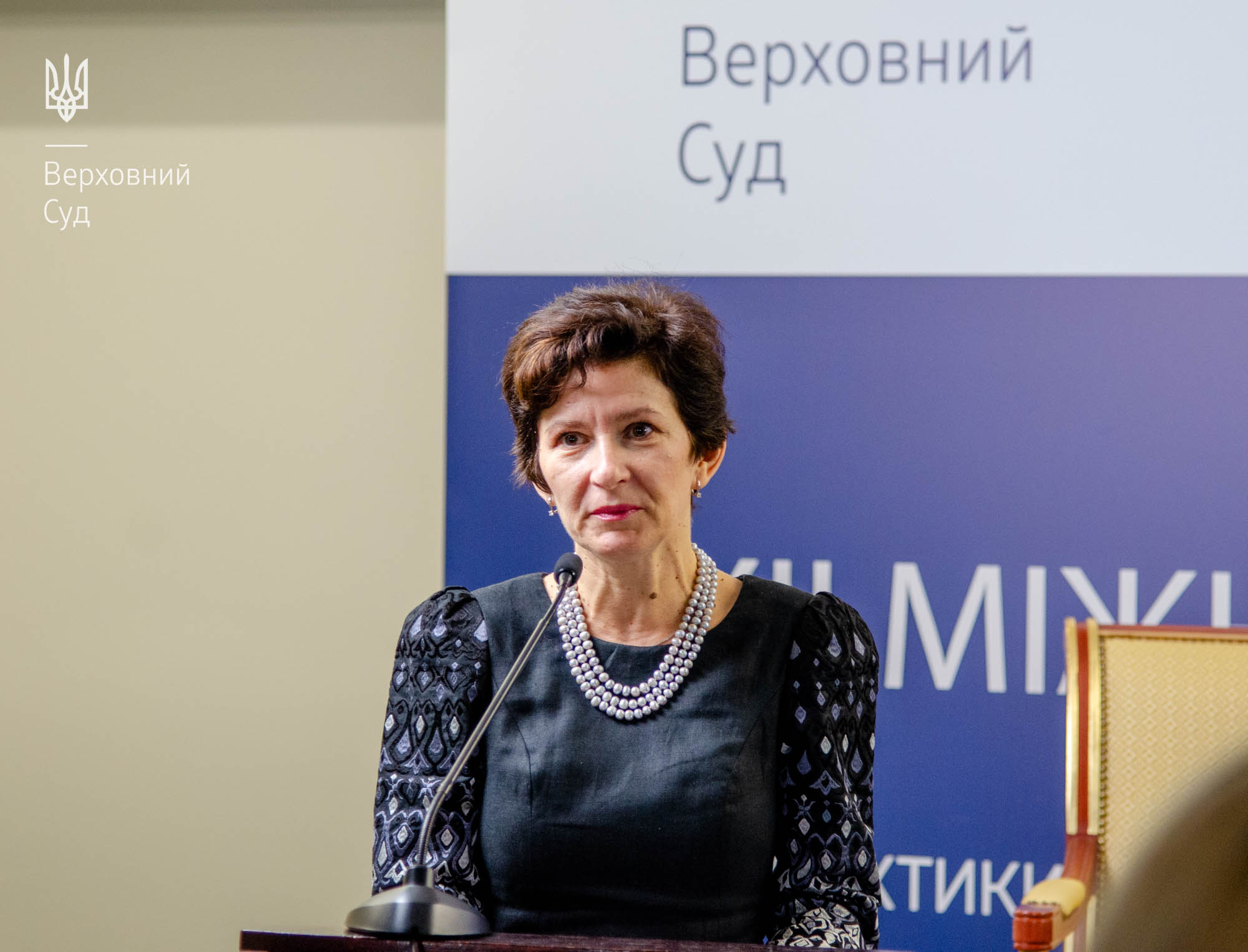
Tetyana Fuley, Head of the Department of Scientific Research on Judicial Proceedings and Scientific and Methodological Support of Judicial Education of the National School of Judges of Ukraine, spoke about the ECtHR case law through gender lines. She noted that one of the ECtHR cases was used by the NSJU developers in a course on overcoming gender stereotypes in the administration of justice. This case clearly demonstrates that gender stereotypes have a direct impact on the judge's perception of the position of a party to a dispute, and can lead to a biased and discriminatory approach by one of the parties and a court decision that does not meet the requirements of fair trial.
The speaker outlined four components of a people-centred approach: designing and delivering people-centred legal services; developing robust justice sector coordination mechanisms; enhancing communication and planning; and evidence-based monitoring and evaluation.
The concept of judicial gross negligence and its interpretation by the European Court of Human Rights was discussed during the seventh session of the forum.
Mykola Gnatovskyy, ECtHR judge from Ukraine, noted that there will be no rule of law without a functional and powerful national judicial system.
The speaker emphasised that under Article 19 of the Convention, the European Court of Human Rights is obliged to ensure compliance with the obligations undertaken by the High Contracting Parties to the Convention. The ECtHR has insisted and will continue to insist that it can only start arguing with a national court when the decision actually violates the rights and freedoms guaranteed by the Convention, and not when a person is dissatisfied with the outcome of the national proceedings.
The event was organised by the Supreme Court jointly with the OSCE Support Programme for Ukraine within the framework of the projects ‘Safeguarding human rights through courts, Phase II’ and ‘Assisting the Supreme Court and higher courts in implementing judicial reform and ensuring access to justice in times of war’ and the Council of Europe projects ‘Support to the functioning of justice in the war and post-war context in Ukraine’, ‘Fostering human rights in the criminal justice system in Ukraine’, ‘Strengthening judicial and non-judicial remedies for the human rights protection of the war-affected people in Ukraine’, the Law Faculty of Ivan Franko National University of Lviv and the National School of Judges of Ukraine.
We would like to remind you that the forum broadcast can be viewed by following the links:
- day one: https://www.youtube.com/live/qlpkSa2SWbc;
- day two: https://www.youtube.com/live/XP2ae6LlK04.